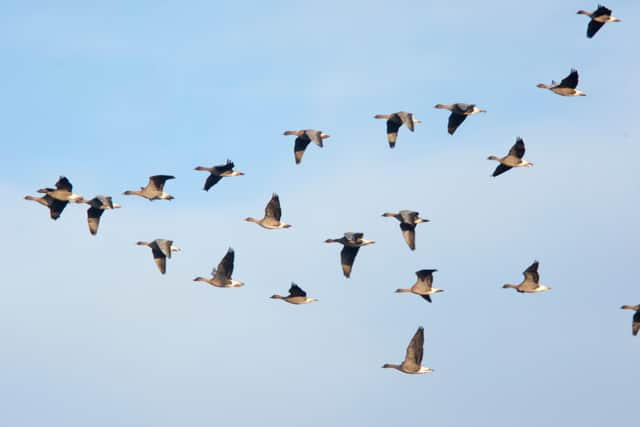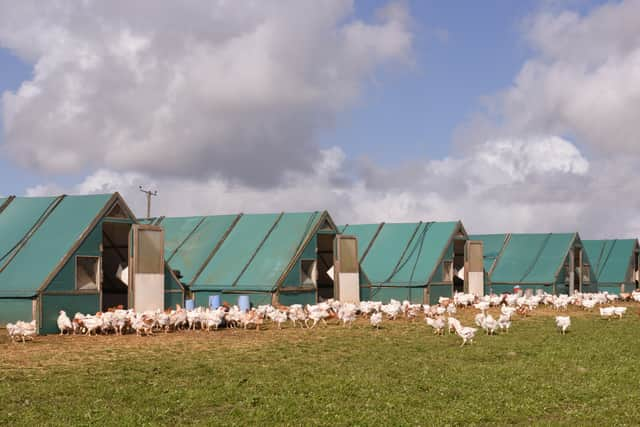Bird flu UK 2022: Defra ‘bird lockdown’ explained amid ‘largest ever’ outbreak of avian flu across the UK


The Covid pandemic has gripped the UK for more than two years, but the country has also been in the grip of another virus - bird flu.
Also known as avian influenza, the disease has had a major impact on the production of eggs, as well as chicken, turkey and duck, for the past two winters.
Advertisement
Hide AdAdvertisement
Hide AdAs a result of its rapid spread, free range eggs have disappeared from shelves, 2.3 million birds have had to be culled - and there has even been one human case of the virus.
However, it is deemed to be a ‘low risk’ to human health.


So what is bird flu, why are birds currently being forced to remain indoors - and why does avian influenza matter?
Here’s everything you need to know.
What is bird flu?
Bird flu is a form of the influenza virus - the same family of viruses which cause flu in humans.
These are completely different to coronaviruses - the category Covid-19 is a part of.
Advertisement
Hide AdAdvertisement
Hide AdAlso known as avian influenza, it is so called because it tends to affect birds more than humans.


The virus either has low pathogenicity - i.e. it isn’t too damaging to health - or high pathogenicity, whereby it can be fatal.
Birds infected with low pathogenicity flu tend to have minor breathing problems and might not produce as many eggs.
Meanwhile, those with highly pathogenic strains can display a whole host of symptoms.
Advertisement
Hide AdAdvertisement
Hide AdThese include: unresponsiveness, closed and excessively watery eyes, a swollen head and tremoring.
What does the UK-wide bird flu housing order mean?
The UK-wide housing measures mean all captive birds, whether they be commercially farmed chickens or pets, must be kept indoors.
It was introduced on 29 November 2021 because there were 65 cases of highly pathogenic bird flu in wild, commercial and pet birds across England, Scotland and Wales.
The lockdown aims to reduce the chance of there being contact between captive birds and wild birds which might be carrying the disease.
Advertisement
Hide AdAdvertisement
Hide AdEven though these strict measures have been in place for more than four months, there have still been dozens of cases recorded across the UK every month.
It is unclear how long the restrictions will continue to be in place for - although the return of warmer, sunnier weather should mean the virus becomes less active.
Housing measures were enforced in the UK last winter when a previous outbreak of highly pathogenic avian influenza swept across the country.
But 2021’s variant of the virus hit the UK harder and earlier than last winter’s version, and does not appear to be abating.
Why does bird flu matter?
Advertisement
Hide AdAdvertisement
Hide AdBird flu matters because it can disrupt the supply chains of some of the UK’s key foods, like chicken and eggs.
If the virus gets onto a farm, all the birds there would have to be culled in a bid to stop it from spreading.
On the biggest farms, this could mean tens of thousands of birds are killed - indeed, 2.3 million birds have had to be culled so far this winter, according to Government figures.
But this figure is small when you consider the UK’s poultry production sees 20 million birds slaughtered every week.
The virus has already had an impact on food supply.
Advertisement
Hide AdAdvertisement
Hide AdBritish free range eggs are no longer on sale as of 21 March because the hens that lay them have been kept indoors for more than 16 weeks - meaning they have to be classified as lower welfare ‘barn eggs’.
A message from the editor:
Thank you for reading. NationalWorld is a new national news brand, produced by a team of journalists, editors, video producers and designers who live and work across the UK. Find out more about who’s who in the team, and our editorial values. We want to start a community among our readers, so please follow us on Facebook, Twitter and Instagram, and keep the conversation going. You can also sign up to our email newsletters and get a curated selection of our best reads to your inbox every day.
Comment Guidelines
National World encourages reader discussion on our stories. User feedback, insights and back-and-forth exchanges add a rich layer of context to reporting. Please review our Community Guidelines before commenting.
